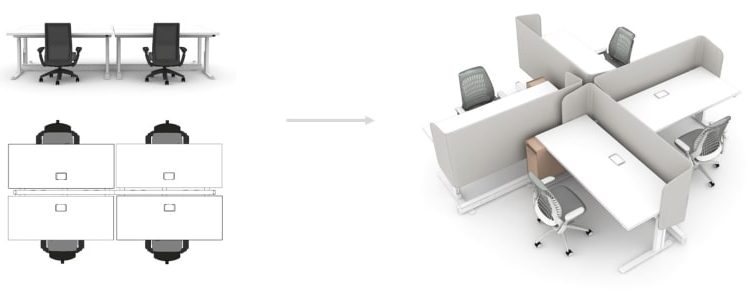by Brianna Crandall — June 26, 2020 — As workers return to the workplace, office products and solutions provider Allsteel has embraced the “Poka-yoke” approach as a powerful guiding product-design philosophy to help employees adapt to these evolved workspaces and reinforced goals, such as social distancing in both workstations and shared spaces, traffic flow, and safer behavior.
Created in the 1960s by Japanese engineer, Shigeo Shingo, Poka-yoke is a Japanese mistake-proofing approach to preventing and eliminating errors by making use of simple but effective tools and signals, explains Allsteel.

Rather than the typical linear configuration, Allsteel’s new guidance recommends using a pinwheel configuration for workstations, with barriers. Image courtesy Allsteel
In an effort to help designers and companies plan for the return to the workplace, Allsteel has developed suggested guidelines and protocols, as well as products and accessories, to help employees and visitors intuitively partake in social distancing while creating physical barriers that do not detract from overall workplace design.
Lauren Gant, PhD, manager of Applied Ergonomics and Human Factors for Allsteel and HNI, explained:
The addition of space-defining elements can help create individual zones in a workspace. Proximity and collaboration are still key to productivity and in order to achieve physically and psychologically-safe work environments, Allsteel is embracing the Poka-yoke method to establish three key dimensions to consider in the evolving workplace: user experience, spatial effectiveness, and distributed work.
Allsteel established three key considerations for the changing workplace:
- User experience considers how employees feel returning to the workplace and how they adapt to new health and safety policies;
- Spatial effectiveness studies how employees use and manage physical workspace, and how to keep them protected and effective through mistake-proofing concepts; and
- Distributed work investigates how organizations can balance various modes of workspaces with the nature of work while supporting workers wherever they are.
Small changes can carry a large impact as people return to their workplace. Utilizing Poka-yoke , Allsteel is invested in assisting clients and customers to consider how furniture shape, design, layering, and orientation can function as intuitive boundaries, in addition to visual cues that define traffic flow and encourage distancing.
The Allsteel guidance includes such measures as removing extra seating to encourage social distancing, using an outward-facing or pinwheel configuration for workstations, and placing visual cues and signage as traffic flow and distancing reminders.
As workplaces change to meet both corporate business goals and establish psychological comfort for employees, Allsteel says it is there to support, listen to, and guide customers to real solutions. Whether in user experience, spatial effectiveness, or distributed work, Allsteel can help companies assess, design and implement a more evolved workplace.
For more information, see Allsteel’s Poka-Yoke: Mistake-Proof Your Space page, which contains a link to the company’s Ready for What’s Ahead e-book.
See also FMLink’s e-book, A Facilities Manager’s Guide to Reopening and Occupying Buildings Safely, which contains comprehensive reopening guidance and resources geared specifically towards building and facilities managers (FMs).




